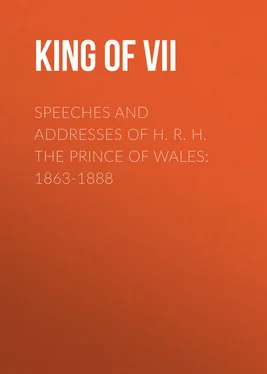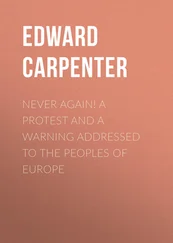Edward VII - Speeches and Addresses of H. R. H. the Prince of Wales - 1863-1888
Здесь есть возможность читать онлайн «Edward VII - Speeches and Addresses of H. R. H. the Prince of Wales - 1863-1888» — ознакомительный отрывок электронной книги совершенно бесплатно, а после прочтения отрывка купить полную версию. В некоторых случаях можно слушать аудио, скачать через торрент в формате fb2 и присутствует краткое содержание. Жанр: История, История, foreign_antique, foreign_prose, на английском языке. Описание произведения, (предисловие) а так же отзывы посетителей доступны на портале библиотеки ЛибКат.
- Название:Speeches and Addresses of H. R. H. the Prince of Wales: 1863-1888
- Автор:
- Жанр:
- Год:неизвестен
- ISBN:нет данных
- Рейтинг книги:3 / 5. Голосов: 1
-
Избранное:Добавить в избранное
- Отзывы:
-
Ваша оценка:
- 60
- 1
- 2
- 3
- 4
- 5
Speeches and Addresses of H. R. H. the Prince of Wales: 1863-1888: краткое содержание, описание и аннотация
Предлагаем к чтению аннотацию, описание, краткое содержание или предисловие (зависит от того, что написал сам автор книги «Speeches and Addresses of H. R. H. the Prince of Wales: 1863-1888»). Если вы не нашли необходимую информацию о книге — напишите в комментариях, мы постараемся отыскать её.
Speeches and Addresses of H. R. H. the Prince of Wales: 1863-1888 — читать онлайн ознакомительный отрывок
Ниже представлен текст книги, разбитый по страницам. Система сохранения места последней прочитанной страницы, позволяет с удобством читать онлайн бесплатно книгу «Speeches and Addresses of H. R. H. the Prince of Wales: 1863-1888», без необходимости каждый раз заново искать на чём Вы остановились. Поставьте закладку, и сможете в любой момент перейти на страницу, на которой закончили чтение.
Интервал:
Закладка:
"Brethren, I feel deeply touched by the excessively kind manner in which this toast has been received by you. I wish to take this opportunity of thanking you for the kind reception you have given me this evening, and I desire especially to express to you the pride I feel at being so heartily received among you as a brother Mason. I feel deeply grateful for the kind words which have fallen from the Deputy Grand Master, and I can assure him and you of my desire to follow the footsteps of my grand uncles, who were so long connected with the craft. Brethren, much has been said against Freemasonry by those who do not know what it is. People naturally say they do not approve secret societies; but I maintain that the craft is free from the reproach of being either disloyal or irreligious; and I am sure you will all support me in that assertion, for I am convinced that Her Majesty has no more loyal subjects than are the Freemasons of England. Brethren, I desire to remind you that when, about 70 years ago, it became necessary for the Government of that day to put down secret societies, my relative the late Duke of Sussex urged in his place in Parliament that Freemasons' lodges ought to be exempt from such a law, and the force of his appeal was acknowledged. From that time Freemasonry has been devoid of politics, its only object being the pure and Christian one of charity. Brethren, I once more thank you heartily for the welcome you have given me this evening, and let me assure you that the interests of Freemasonry shall be always upheld and respected by me."
Other toasts, usual at Masonic festivals, having been given, the Prince of Wales proposed success to the institution, and made a statement respecting its position and progress: —
"Freemasons had fully recognized the importance of education – a subject which had of late so much occupied the public mind – and had founded many schools. The Royal Masonic Institution for Boys was founded in 1798, when six boys were admitted. In 1810, when the jubilee of the reign of George III. was celebrated, the number was increased to 50, and now there were 110 in the school. The total cost of the new building had been £47,000 of which £5000 was still owing, while there were other matters which raised the total liability to £10,200. There were now 155 candidates for admission, but there were only nine vacancies, although 20 more boys could be admitted if the institution was free from debt. He was sure he had only to mention these facts to so distinguished an assemblage of Masons to insure a response which would greatly forward the prosperity of the institution."
INTERNATIONAL EDUCATIONAL EXHIBITION
In everything pertaining to Exhibitions, national or international, the Prince of Wales has never grown weary, even when the public interest has seemed to flag. On the 4th of April, 1870, His Royal Highness presided at the rooms of the Society of Arts, in connection with the "Educational Section" of a series of proposed International Exhibitions. On rising to open the proceedings, the Prince said: —
"We are assembled here for the purpose of organizing the educational section of the Exhibition to be held in 1871. I appear before you on this occasion in a double capacity, for I hold the position of President of your Society, and I am President of the Royal Commission of 1851, having succeeded in this post the late lamented Lord Derby, whose name will always be remembered among the names of our great statesmen, and who will be greatly missed from that Commission, the interest of which he had so much at heart.
"The long-standing connection of the Society of Arts with Exhibitions is well known, and in these very rooms the Exhibitions of 1851 and 1862 were first planned. This Society is, I consider, well qualified to deal with the subject before it, and I assure you that it is a great gratification to me to preside here and show that I am entirely alive to the great question of the day – that of education.
"I have now to state that the meeting to-day is of members of a large Committee, of persons eminent in their various stations for the interest they have displayed in education, and that it has been appointed without reference to politics, party, denomination, or social position, for the purpose of obtaining the best possible representation in 1871 of the various materials and apparatus used in teaching, and exhibiting, as far as practicable, the results of the many systems of instruction which are in operation in this country and in other nations of the world. Under the first class we find such objects as affect the sanitary condition of schools – the desks and stools used, maps and globes, books, pictures, scientific diagrams, objects of natural history, and the like. Under the second class will be shown illustrations of modes of teaching, drawing, reading, writing, music, and gymnastics, and the interesting work of educating those whom nature has deprived of sight, speech, and hearing, with examples of the successful results.
"In this Exhibition of Education, foreigners as well as British subjects will take their share, and I am happy to say that Sweden has already applied for permission to exhibit a full-sized model of one of its parish schools. The duty of this Committee is to see that such work as I have sketched out shall be completely accomplished, that exhibitors shall come forward and offer their productions, that the best only shall be selected for exhibition, and that discussions on systems of instruction shall be organized. I indulge a sanguine hope that the labours of this Committee may teach lessons which will lead to the improvement of the quality of primary education, and to the extension of that secondary instruction in science and art so much needed for the industrial progress of this country, a necessity proved at the Exhibition of 1851, originated and conducted by my illustrious father, and confirmed again in 1862, and at Paris in 1867, where our own artisans showed by their remarkable reports how strong were their convictions on this point. Difficulties there are, as there must ever be, in the completion of a great work, and here I am reminded how fully the difficulties connected with this work of education were appreciated by my father as long ago as 1851. But my visit with the Princess of Wales to the Middle Class Schools in the City of London on Wednesday last, and the reports on Faversham School and the District Union Schools of the Metropolis, which have been published by our Society, lead me on to hope that even these difficulties may admit of solution.
"By improved organization of schools and teaching power, I think that it is shown that instruction may be so given as to enable earning and learning to go hand-in-hand together. I close these few remarks by bidding 'God speed' to this Committee in the great work that is before them. Two resolutions will be offered for your acceptance, and any explanation which may seem necessary will be afforded."
The resolutions, moved by Sir John Pakington, and by the Hon. W. Cowper Temple, were to the effect that the meeting warmly approved of the proposed International Educational Exhibition, which would not only receive His Royal Highness's sanction, but his personal assistance and co-operation. It was explained that the feature of these Exhibitions would be the arrangement of objects illustrating the progress of art and industry, not according to countries, but according to classes. On the proposal of a vote of thanks to the chairman of the meeting, the Prince said: —
"I require and desire no thanks at all. It has given me great pleasure to be here to open the proceedings, and I cordially thank all the gentlemen who have so kindly supported me on this occasion. I beg again to assure you that I take a very deep interest in this question – that of education, and that I shall be always ready to give my hearty co-operation on a subject of this important bearing."
Читать дальшеИнтервал:
Закладка:
Похожие книги на «Speeches and Addresses of H. R. H. the Prince of Wales: 1863-1888»
Представляем Вашему вниманию похожие книги на «Speeches and Addresses of H. R. H. the Prince of Wales: 1863-1888» списком для выбора. Мы отобрали схожую по названию и смыслу литературу в надежде предоставить читателям больше вариантов отыскать новые, интересные, ещё непрочитанные произведения.
Обсуждение, отзывы о книге «Speeches and Addresses of H. R. H. the Prince of Wales: 1863-1888» и просто собственные мнения читателей. Оставьте ваши комментарии, напишите, что Вы думаете о произведении, его смысле или главных героях. Укажите что конкретно понравилось, а что нет, и почему Вы так считаете.












